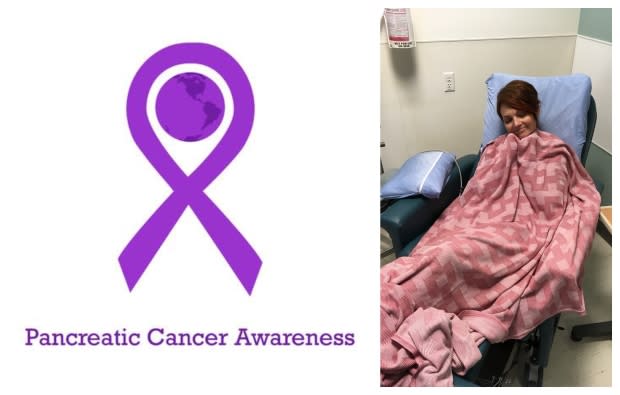Mom pushes tests for deadly pancreatic cancer that may steal her future Christmases
In early July, Calgarian Leesa Dolynchuk's doctor made an unexpected house call.
He had bad news.
After nearly a year of suffering from persistent abdominal pain, pushing for answers from health professionals, taking more tests and finally paying for a CAT scan out of pocket to speed up the process, Dolynchuk had answers.
"The doctor came and told me that I had what they thought was cancer — and it changes your life completely," she said.
Her official diagnosis: Stage 4 pancreatic cancer.
Surgery was scheduled for a month later.
"It was a lot of spending time with my family and doing everything I could before that surgery time," she said.
'One of the lowest survival rates'
Michelle Capobianco, executive director for Pancreatic Cancer Canada, says it's important to raise awareness for the disease all the time, but especially on Nov. 15, Pancreatic Cancer Awareness Day.
Although only 5,500 people a year are diagnosed in Canada, pancreatic cancer is expected to be the second biggest cancer killer by 2020.
"It has one of the lowest survival rates at only five per cent," Capobianco said.
"Ninety-three per cent of Canadians diagnosed do not survive.… Only 20 per cent of those original people diagnosed are eligible for surgery, and then only 20 per cent of those people go on to survive the surgery and survive the disease."
'I told my kids that I wouldn't be cured'
Dolynchuk, 37-year-old wife and mother of two, says after learning these heartbreaking facts came the hardest part. She had to talk to her kids.
"You never know how much you want to share or how your kids are going to take it," she said.
"At the time, I told my kids that I wouldn't be cured. I had just been told I had four to six months to live, or up to 10 with chemo."

The conversation with her nine- and 11-year-olds went how you might expect.
"I was trying to face the reality that I wouldn't be there for their next Christmas. This was going to be the last I spent with them. It didn't go very well," she said. "It was the most heartbreaking conversation I ever had."
Dolynchuk said it was important for her to be honest with her kids.
"If it didn't go well and I did only have four to six months, I didn't want them to think all along that mommy was still going to get better," she said.
'That gave me the most hope'
But since having that heartbreaking conversation, a new light has started to shine on Dolynchuk, and she and her family are off Sunday to Vienna, where she will have specialized treatment at a pancreatic cancer clinic.
"I heard the story of someone else who has been to Vienna and that gave me the most hope I have had this whole time," she said, holding back tears.
"This person had the pancreatic cancer Stage 4 as well and he's in non-partial remission," she said. "The success rate of this clinic is 47 per cent for metastatic cancer. So I fully believe that I am going to go and I am going to be healed."
Dolynchuk said she hopes people take the time on Thursday to learn about what pancreatic cancer is and how they can help find cures.
Vague symptoms
Capobianco said pancreatic cancer is hard to find (because the pancreas is behind the stomach) and even harder to diagnose because of the vague nature of the symptoms.
"It is a pain that won't go away between your shoulder blades, it's a mild sense of nausea, tiredness, trouble sleeping, and some people get itchy skin," she said. "But as you can imagine, for some people that's a Monday."
Capobianco said it's important for people experiencing these symptoms to advocate for themselves, because more often than not, the disease isn't properly diagnosed until it's already Stage 4 and has metastasized — meaning it's spread to other organs.
"Go to our website, print off the symptoms and take it to your doctor and say, 'This is what I'm afraid I have. Here are the things it can be misdiagnosed as. Would you please send me for a CT scan or MRI because that's what I need to be comfortable,'" she said.
Help for patients
Capobianco said that as pancreatic cancer creeps up the list of most deadly cancers, researchers and foundations like Pancreatic Cancer Canada are teaming up.
"The thing we're most excited about is a network that we created here called PancOne," she said. "And so we brought all of the best from the centres of excellence we recognize from across the country, where they share research and they share funds. That means no wasted money, no duplicated research."

Capobianco said that, between 2011 and 2015, there were 1,620 cases of pancreatic cancer diagnosed in Alberta. Of those cases, 56 per cent were already metastatic at diagnosis.
'We know it's not a one-size-fits-all'
In order to make a change for pancreatic cancer patients across North America, they're taking a page out of the book of breast cancer advocates through their PanGen project.
"The goal is to better understand what drives the pancreatic cancer so they can start characterizing the cancer to find new treatments," she said.
Capobianco said that with breast cancer there has been targeted therapy for estrogen receptor positive breast cancer and for bracket two sub-types and beyond.
"That's what we want to do for pancreatic cancer, start sub-typing so we can find the right cure for each person. Because we know it's not a one-size-fits-all. "
She said that most importantly, people need to know that in supporting pancreatic cancer research they're helping people with the diagnosis buy time.
"Which becomes so precious when you have pancreatic cancer."

